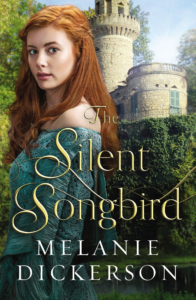Romance and danger abound in Melanie Dickerson’s fairy-tale retellings, the latest of which is A Silent Songbird (Thomas Nelson), a reimagining of The Little Mermaid. After running away from her royal family to escape an arranged marriage, Evangeline joins a group of traveling servants and pretends to be mute to keep her identity hidden. The group’s handsome leader is intrigued, but what will happen when he discovers her secret? In this exclusive Q&A, Melanie discusses why she chose The Little Mermaid as the basis for this novel, her research into the English monarchy, and why she believes storytelling is such a powerful way to communicate….
 I know that A Silent Songbird is a retelling of The Little Mermaid. What inspired you about that fairy tale and led you to craft such a lovely retelling?
I know that A Silent Songbird is a retelling of The Little Mermaid. What inspired you about that fairy tale and led you to craft such a lovely retelling?
I loved the emotion behind a girl who wants to be something she’s not in order to get the love she’s desperate for. I wanted to write the story of a girl who would give up everything for love, and then discover how to reconcile with God after doing something everyone else in her life believed was wrong. I could relate to a girl like that.
I was also inspired by an article in an archeology magazine that I read while waiting at the library for my daughter, who had a meeting there. The magazine showed examples of graffiti that medieval people had carved into church walls and baptismal fonts. The graffiti was a desperate attempt to communicate with God, and it really touched me. I knew I had to incorporate it into my story.
Did any of the characters surprise you in the course of writing the book? If so, how?
Evangeline started out as a sheltered girl, a little self-centered, but she become very unselfish and courageous. I never know my characters very well when I start writing, but I discover what they’re all about as I write and as they react to different situations.
Beyond reading the original fairy tales, what type of research do you do for your fairy-tale romances?
For The Silent Songbird I had to find a historical figure who could have fathered a child who would be a ward of the king. So I had to do a lot of research on the English monarch Richard the Second and his family members. I also had to research the castles belonging to him to find a place for Evangeline to live. It was quite fun, since I love castles. I always have to do some research, but the exact type of research depends on the story. Every story is different.
Why do you think that storytelling is such a powerful way to communicate truth?
Stories are easy to relate to and easy to remember. You can say, “Actions speak louder than words,” but when Jesus illustrates that with a story about two brothers, one who tells his father he will go into the field and work but then doesn’t, and the other brother who says he won’t go but then changes his mind and goes out to work after all, we can “see” the principle in a way we can relate to. It has more meaning and is easier to apply to own lives.
How does your faith inform your writing?
I can’t really imagine living life without my relationship with God or my foundation of faith, so it would be hard to write about characters who don’t have faith in God. A relationship with Jesus doesn’t keep you from having problems, but he affects how you respond to your problems.
Can you give our readers a hint about what you are working on now?
I’m working on the finishing touches to an Aladdin story called The Orphan’s Wish, and I’m starting a Mulan story, both of which are continuing the Hagenheim series.


